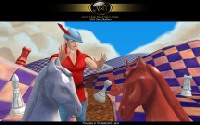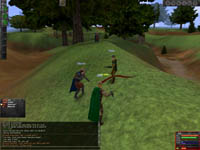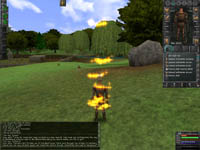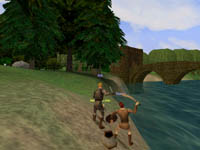|
|
|
Main News Forums Games Games Database Top 100 Release List Support Files Features Reviews Previews Interviews Editorials Diaries Misc Download Gallery Music Screenshots Videos Miscellaneous Staff Members Privacy Statement |
Dark Age of Camelot Beta Impressions Arkray, 2001-06-12
The first thing to do is to choose the realm in which your character is going to live. After doing that is the moment to select the remaining characteristics of you alter ego: First you must select your race. There are 4 available per realm: - Briton, Saracen, Highlander or Avalonian in Albion - Kobold, Troll, Norseman or Dwarf in Midgard Then you choose gender, face and hair colour. One special feature in the ability to set your character's height from short via average up to high, which adds more character customization to the character generation process. Next thing to do is choosing the base class from one of the following: - Fighter, Mage, Rogue, Elementalist or Acolyte in Albion - Viking, Mystic, Rogue or Seer in Midgard The Acolyte and the Seer are the base classes for clerics or Midgard healers. As usual in these kind of games, depending on your race you have only certain classes available, so you have some stats developed more than others. Besides those, you receive a number of points to distribute on your basic stats like strength, constitution, dexterity, quickness, intelligence, piety, empathy and charisma. And the last step before entering the game is to name the character; in case you don't feel inspired enough the game provides a name generator. And it is now that the game opens to any recently created character:
The starting equipment consists of a practice weapon depending on the base class. So it is time to search for adventures to earn some coins and experience. On leaving the home town, one realizes the map is huge and seamless, so you can travel from one side to another without any loading screen (that is of course, if you do not get killed or tired of running, because the way is really long). By killing monsters and solving quests, players get experience and treasure. On level ups, you get training points to raise certain skills. Once a player reaches level 5, he must choose an advanced class, for example, the base class rogue characters can become scouts, minstrels (bards) or infiltrators, which adds lots of class variations… One feature I have always found very interesting in MMORPG's is building player groups. These allow you to see how powerful a party formed by members of different classes can become and how everyone plays his role in the battlefield. DaoC is no exception here. The game encourages grouping, so players can fight stronger monsters and get more experience, even though solo playing is still possible.
Another major complaints in MMORPG's is death penalty. In DaoC, it is dealed with in a new way: The most important fact is that equipment never gets lost - so there's no more unprotected trips to dangerous places where one died. Until one reaches level five, there is no death penalty, but after that, players lose experience and get a constitution penalty. This can be recovered praying at the character's grave built at the death place or paying an NPC healer for a restoration service. It is very interesting, that players can be resurrected by clerics without any penalty, making them very valuable. While exploring around, one realizes that both realms have beautiful landscapes. The downview from a hill or mountain is really impressive, and the map is full of interesting places to find and to explore. Graphics are stunning, especially armour textures and the amazing spell effects.
The beta development is currently testing PvP and with the Celtic Realm and Hibernia as well as trading skills, player guilds and dungeons to be added soon this game seems to be the evolution in MMOPRG's players are waiting for. DAoC could be the next Online Game to be released after Anarchy Online, the second generation in MMORPG's and both will be on top of players' preferences, so they have lots of efforts on their design.
Average Reader Ratings: 7.62 (125 votes) |
|||||||
|
All original content of this site is copyrighted by RPGWatch. Copying or reproducing of any part of this site is strictly prohibited. Taking anything from this site without authorisation will be considered stealing and we'll be forced to visit you and jump on your legs until you give it back. |
||








